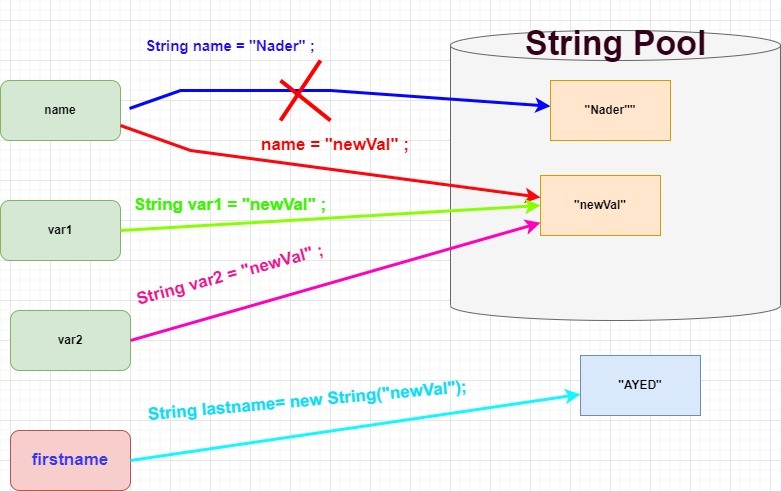Why Are Strings Immutable in Java? Trick Factors and Advantages Discussed
Why Are Strings Immutable in Java? Trick Factors and Advantages Discussed
Blog Article
Immutable Strings: A Trick Component in Ensuring Information Uniformity and Reliability
In the world of information management, the importance of unalterable strings can not be overemphasized. These unvarying sequences of characters play a crucial duty in promoting the stability and accuracy of info within systems. By keeping a state of immutability, data uniformity is made certain, promoting a structure of integrity whereupon vital processes rely. The concept of unalterable strings transcends simple triviality; it is a linchpin in the complex web of data administration. As we explore the benefits, implementation approaches, and practical applications of immutable strings, a clearer photo arises of their important nature in protecting the digital landscape.
The Idea of Immutable Strings
Immutable strings, a fundamental concept in programming, refer to strings that can not be modified as soon as they are created. Basically, once a string worth is designated, any procedure that appears to customize the string really develops a new string. This immutability ensures information consistency and dependability in applications, as it avoids unexpected changes to the initial information.
Advantages in Data Uniformity

Data uniformity is crucial in numerous facets of software program advancement, consisting of database management, multi-threaded environments, and distributed systems (Why are strings immutable in Java?). Unalterable strings add substantially to attaining this consistency by avoiding information corruption due to simultaneous gain access to. In circumstances where numerous procedures or threads engage with the very same data at the same time, unalterable strings act as a guard versus race conditions and synchronization issues
Additionally, the immutability of strings streamlines debugging and testing procedures. With immutable strings, programmers can rely on that as soon as a string is set, it will continue to be unmodified, making it much easier to trace the source of errors and ensuring that examination situations create constant outcomes. This reliability in information taking care of eventually brings about much more stable and durable applications.

Executing Unalterable Strings
Guaranteeing the immutability of strings requires a thoughtful strategy to their execution in software growth. One crucial strategy is to develop string courses in such a way that avoids alterations as soon as a string object is developed. By making strings immutable, programmers can enhance information uniformity and dependability in their applications.
To apply immutable strings properly, programmers ought to prefer creating new string items instead of modifying existing ones. This method ensures that as soon as a string is assigned a value, additional resources it can not be transformed. Furthermore, any type of procedure that appears to change the string needs to create a brand-new string with the desired changes rather of modifying the initial.
In addition, utilizing unalterable strings can streamline concurrency administration in multi-threaded environments. Considering that unalterable strings can not be transformed after production, they can be securely shared among multiple strings without the risk of data corruption.
Duty in Integrity Assurance
In software program growth, the usage of immutable strings plays a critical role in guaranteeing the integrity of data procedures. Unalterable strings, when created, can not be modified, making sure that the information they represent stays constant throughout the application's execution. This immutability residential or commercial property offers a level of guarantee that the data being processed will not be unintentionally changed, causing unanticipated end results or errors in the system.
By including unalterable strings right into software design, designers can enhance the integrity of their applications by reducing the useful content risks related to mutable data - Why are strings immutable in Java?. Unalterable strings aid in stopping data corruption or unintended modifications, which can be specifically essential when dealing with delicate info or when data stability is paramount
In addition, the usage of immutable strings simplifies concurrent processing, as numerous threads can safely accessibility and share string data without the danger of one thread modifying the content while one more is reading it. This aspect adds considerably to the general dependability of the software system, making certain predictable and regular habits in information dealing with operations.
Applications and System Assimilation
The smooth combination of unalterable strings into different applications and systems is essential for guaranteeing durable data uniformity and dependability throughout varied technical environments - Why are strings immutable in Java?. Unalterable strings play an important duty in boosting the integrity of information exchanges and interactions within complicated software program ecological communities. By including unalterable strings into applications, programmers can reduce the risks linked with data tampering, unauthorized alterations, and inadvertent modifications, thereby fortifying the general protection posture of the system
In the context of system integration, unalterable strings act go to my site as a foundational component for developing secure communication channels and assisting in seamless information transfers in between various parts. Their immutable nature makes certain that information transmitted in between systems remains the same and proven, lowering the possibility of variances or errors that could compromise the integrity of the entire system. Additionally, unalterable strings can improve interoperability in between disparate systems by giving a standardized format for data representation, enabling extra effective information processing and exchange methods throughout interconnected platforms. By adopting immutable strings in applications and system combination procedures, companies can fortify their data facilities and maintain the integrity and uniformity of their details properties.
Verdict
Finally, immutable strings play an important duty in preserving data uniformity and reliability in different applications and system integrations. By ensuring that strings can not be changed once developed, the stability of information is maintained, decreasing the risk of mistakes and inconsistencies. Executing unalterable strings can considerably boost the dependability of systems, ultimately bring about even more reliable and exact data handling.

Report this page